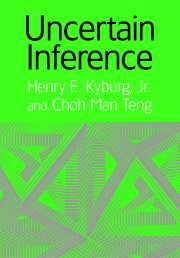Book contents
- Frontmatter
- Contents
- Preface
- 1 Historical Background
- 2 First Order Logic
- 3 The Probability Calculus
- 4 Interpretations of Probability
- 5 Nonstandard Measures of Support
- 6 Nonmonotonic Reasoning
- 7 Theory Replacement
- 8 Statistical Inference
- 9 Evidential Probability
- 10 Semantics
- 11 Applications
- 12 Scientific Inference
- Names Index
- Index
5 - Nonstandard Measures of Support
Published online by Cambridge University Press: 07 December 2009
- Frontmatter
- Contents
- Preface
- 1 Historical Background
- 2 First Order Logic
- 3 The Probability Calculus
- 4 Interpretations of Probability
- 5 Nonstandard Measures of Support
- 6 Nonmonotonic Reasoning
- 7 Theory Replacement
- 8 Statistical Inference
- 9 Evidential Probability
- 10 Semantics
- 11 Applications
- 12 Scientific Inference
- Names Index
- Index
Summary
Support
As Carnap points out [Carnap, 1950], some of the controversy concerning the support of empirical hypotheses by data is a result of the conflation of two distinct notions. One is the total support given a hypothesis by a body of evidence. Carnap's initial measure for this is his c*; this is intended as an explication of one sense of the ordinary language word “probability.” This is the sense involved when we say, “Relative to the evidence we have, the probability is high that rabies is caused by a virus.” The other notion is that of “support” in the active sense, in which we say that a certain piece of evidence supports a hypothesis, as in “The detectable presence of antibodies supports the viral hypothesis.” This does not mean that that single piece of evidence makes the hypothesis “highly probable” (much less “acceptable”), but that it makes the hypothesis more probable than it was. Thus, the presence of water on Mars supports the hypothesis that that there was once life on Mars, but it does not make that hypothesis highly probable, or even more probable than not.
Whereas c*(h, e) is (for Carnap, in 1950) the correct measure of the degree of support of the hypothesis h by the evidence e, the increase of the support of h due to e given background knowledge b is the amount by which e increases the probability of h: c*(h, b Λ e) – c*(h, b). We would say that e supports h relative to background b if this quantity is positive, and undermines h relative to b if this quantity is negative.
- Type
- Chapter
- Information
- Uncertain Inference , pp. 98 - 116Publisher: Cambridge University PressPrint publication year: 2001



